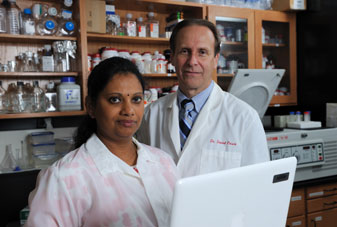Natural Products Center, Cancer Institute
form new drug-discovery core

The Drug Discovery Core, directed by David Pasco, will screen natural products for anti-cancer compounds and send the most promising samples to the University of Mississippi Medical Center for further testing. Also pictured is NCNPR research scientist Premalatha Balachandran.
new partnership takes drug discovery from start to finish.
Focusing on cancer-fighting drugs, the partnership combines the compound identification and screening expertise at the School of Pharmacy's National Center for Natural Products Research with the drug development and clinical trials capabilities at the Cancer Institute at the University of Mississippi Medical Center.
An agreement between the center and the institute creates the Drug Discovery Core, which will be directed by David Pasco, assistant director of NCNPR and research professor in pharmacognosy.
The drug-discovery process begins at NCNPR, where researchers collect plants and other natural products, create extracts and screen them for activity against given targets. Under the new agreement, the most promising anti-cancer compounds will be further isolated and sent to Jackson for development and testing.
"Cancer institutes usually have some type of drug-discovery program," Pasco said. "Since Dr. (Lucio) Miele's arrival, Dr. Larry Walker (NCNPR director) and I have been talking with him about this venture."
Miele took the Cancer Institute directorship in summer 2009. He's worked to expand the institute's research mission by hiring scientists, purchasing high-tech equipment and forging partnerships with other institutions. Founding the Drug Discovery Core is a milestone in that effort.
"Development of new anti-cancer agents is one of the most important aspects—if not the most important aspect—of cancer research," Miele said. "The natural products center has tremendous experience, and this agreement increases the synergy between our two campuses.
"Natural products are a rich source of drug discovery and have yielded some of the most potent drugs we still use, the best example being Taxol®," said Miele, referring to a leading cancer drug derived from the Pacific yew tree. UM researchers worked with the companies developing this drug during the years NCNPR was being created.
Cancer research has advanced to the point where scientists have identified most genes and gene mutations responsible for causing cancer. Those are the targets of drug developers.
"There are several hundred genes identified," Pasco said. "But they all belong to about 12 different signal-transduction pathways."
Blocking those pathways with specially designed drugs can essentially keep genes from switching on or off.
In Oxford, Pasco and his team have screened about 30 plant extracts that are used in traditional Chinese and Indian medicine, some with proven anti-cancer properties. The screenings assessed the activity of each extract along the dozen or so pathways. About 25 extracts showed activity on several of the signaling pathways.
"Specific collections of these pathways are involved in the expression of different cancers," Pasco said. "And there's a lot of cross talk among those pathways. That's what makes cancer so difficult to treat."
Investigators will search the screening results for unique patterns of activity among the various signaling pathways.
"Once we find an interesting extract, we can tear it down further to get at the active compound," Pasco said.
Sometimes it's multiple compounds that work together in one extract to make it promising. Getting to the core of that scenario is one of the NCNPR's specialties, Miele said.
Ultimately, by combining several compounds, scientists in the Drug Discovery Core hope to create pharmaceuticals that act on a number of key pathways.
"Because cancer is so complicated, you need to use a range of compounds to prevent the tumors from becoming resistant to the compounds you're using," Pasco said.
Those combinations of compounds—candidate drugs—will be sent to UMMC labs in Jackson for in vitro testing on various cancer cell lines, Miele said. Once proven in vitro, researchers would test the drugs on tumors in animal models, likely mice or rats. The next phase would take candidate drugs to carefully regulated clinical trials administered by the Cancer Institute.
NCNPR is the nation's only university-affiliated research center devoted to improving human health and agricultural productivity through the discovery, development and commercialization of pharmaceuticals and agrochemicals derived from natural products.
The Cancer Institute, founded in 2004, combines cutting-edge care for patients, basic science and clinical research, and education and training of the next generation of cancer care providers.
| 
